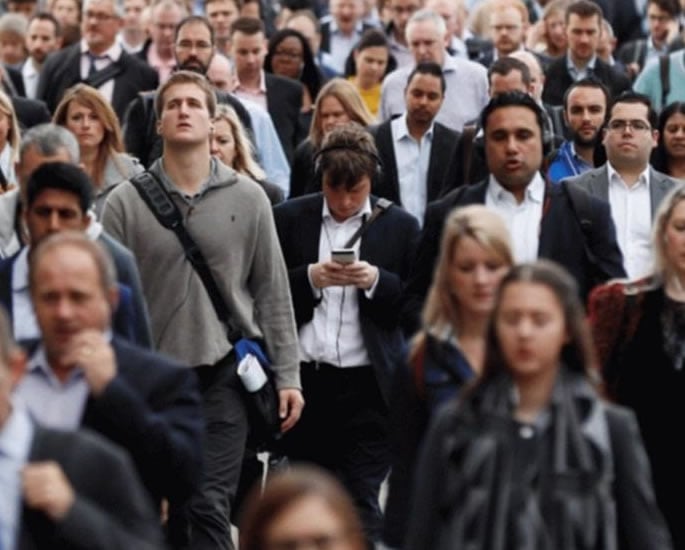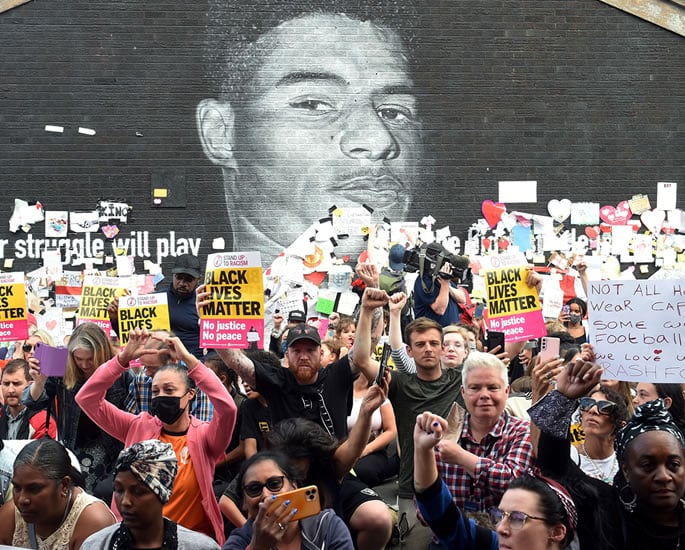Is Racism Still a Problem in the UK Today?
18% of the British public agreed with the statement.
Despite being one of the world’s most diverse nations, the United Kingdom still struggles with racism.
Across various sectors of society, including employment, housing and the justice system, racial inequalities remain persistent and often deeply ingrained.
According to government figures, ethnic minorities are still at a disadvantage when it comes to securing well-paying jobs, with many experiencing workplace discrimination and limited opportunities for career advancement.
Similarly, in the housing sector, minority groups are disproportionately represented in overcrowded, substandard accommodations, with limited access to affordable housing options.
In the justice system, ethnic and racial disparities are particularly stark.
Research has shown that Black, Asian, and minority ethnic individuals are more likely to be stopped and searched by police and are also more likely to receive harsher sentences than their white counterparts.
This has led to calls for greater diversity and cultural sensitivity within the police force, as well as for the reform of sentencing guidelines to ensure that justice is applied fairly and equitably.
Does Social Inequality have a Link to Racism?


Critics could argue that disparities in social inequalities do not prove that racism and discrimination are the driving forces.
However, when combined with other direct evidence, it is difficult to avoid concluding that they play a role.
There are two main sorts of direct evidence that show racism and racial injustice continue in Britain – surveys about British people’s beliefs and field experiments testing whether minorities receive equal treatment in practice.
Through the European Social Survey, a representative sample of the British public was asked two questions on “biological racism” – that is, the belief that there are innate differences between racial or ethnic groups.
A belief that innate differences make some groups inherently superior to others is generally taken to be the core idea of racism.
One question asked whether interviewees agreed that “some races or ethnic groups are born less intelligent than others”.
It found that 18% of the British public agreed with the statement.
The other question asked whether “some races or ethnic groups are born harder working than others,” to which 44% said yes.
On this evidence, a substantial minority of the British public subscribes to some form of racist belief.
In a 2019 nationally representative online survey, the questions on biological racism were repeated, and the findings were very similar – 19% agreed that some groups were born less intelligent and 38% agreed that some groups were born less hard-working.
People who subscribed to these racist beliefs were more likely to be opposed to immigration and to express other “nativist” views, such as that one needs to have English ancestry to be truly English.
However, people who agree with these racist statements in an interview may not necessarily act on them in practice.
Field experiments can provide more direct evidence about what happens in practice.
To investigate discrimination in the job market, researchers typically send matched written applications from fictitious minority and majority-group applicants to advertised vacancies.
The applications are identical in all respects and differ only in the names of the applicants, which are selected to be typical British or minority names respectively.
Field experiments like these are generally recognised as the “gold standard” for determining whether minorities are at risk of discrimination.
In 2016 and 2017, a study was carried out along these lines.
It was found that applicants with typically black or Muslim names were much less likely than those with standard British names to receive a positive response from employers.
For every ten positive replies that the British applicant received, a person with a recognisably African or Pakistani name received only six.
Minorities with a Western European name were only slightly less likely than the British to obtain a positive callback.
In 2018, interviews were conducted by a media organisation for a similar field experiment in the private flatshare market.
Expressions of interest were sent from “Muhammad” and “David” to almost 1,000 online advertisements for rooms across the UK.
The interviewers found that for every 10 positive replies that David received, Muhammad received only eight.
While some may argue that the disparities in employment, housing, and the justice system faced by Black and minority ethnic groups in the UK are not necessarily driven by racism and discrimination, the evidence suggests otherwise.
The government’s own data and field experiments testing for discrimination provide conclusive evidence that minorities are at risk of unequal treatment in these areas.
While we cannot be sure that all employers and landlords are acting on racist beliefs, the outcome of discrimination is illegal and unacceptable regardless of the motivation behind it.
Are Racist Beliefs Still Prevalent in the UK?


The evidence of racist beliefs held by a substantial minority of the British public indicates that racism is still a problem in the country.
Such beliefs can contribute to the marginalisation and discrimination of minority groups, even if those beliefs are not acted upon directly.
The study highlights the ongoing problem of racism and xenophobia in modern societies and how these attitudes can manifest in different areas of life.
In the case of immigration, individuals who hold racist beliefs may view foreign individuals as a threat to the cultural and ethnic purity of their society.
They may also fear competition for jobs or resources and may hold misguided beliefs about the economic impact of immigration.
At the same time, the idea of “Englishness” as a strictly defined concept tied to ancestry is a clear example of nativism.
This view ignores the complex history of immigration and cultural exchange that has shaped the UK over the centuries.
It also excludes individuals who may have grown up in England, but whose heritage or cultural background is different from the dominant group such as Prime Minister Rishi Sunak.
These beliefs can have serious consequences for the individuals and communities affected by them.
For example, individuals who are seen as “foreign” or “other” may face discrimination in the job market, in housing, or other areas of life.
They may also experience harassment or violence, either directly or indirectly, as a result of xenophobic attitudes.
It is important to note that these attitudes are not necessarily confined to a small group of individuals or fringe groups.
They can be found across different levels of society, from individuals who hold explicit racist beliefs to those who may unconsciously hold biases or stereotypes about certain groups.
They may also be reinforced or perpetuated by media coverage, political discourse, or other forms of cultural messaging.
What Needs to Change?


To address these harmful ideologies, it is important to take a multi-faceted approach that addresses the underlying social and economic factors that contribute to racism and xenophobia.
This may include efforts to improve education and awareness around issues of diversity and inclusion, as well as targeted interventions to support marginalised communities and address structural and social inequalities.
It is also important to address how racism and xenophobia are perpetuated by political discourse and media coverage.
This may involve holding politicians and media outlets accountable for their language and messaging and promoting more positive representations of diversity and inclusion in the public domain.
At the same time, it is important to recognise that changing attitudes and beliefs is a long-term process that requires sustained effort and commitment.
It is not enough to simply condemn racism and xenophobia – we must actively work to create a more just and equitable society in which everyone can thrive.
By acknowledging and addressing the deep-seated attitudes and beliefs that contribute to discrimination and prejudice, we can build a more inclusive and welcoming society for all.
Of course, it is important to acknowledge that not all individuals or institutions are guilty of racist attitudes or practices and that progress has been made in some areas, such as increased representation of ethnic minorities in public life and the media.
However, the persistence of racial inequalities and the evidence of racist beliefs and discriminatory practices suggest that more needs to be done to address racism in Britain.
This includes not only tackling overt acts of racism but also addressing the more subtle biases and inequalities that can perpetuate disadvantages for certain groups.
It is essential to recognise and address these issues to create a more just and equitable society.
More testing and research may be needed to fully understand the extent of the problem, but there is no doubt that real change is needed to ensure that everyone in the UK is treated fairly and without prejudice.